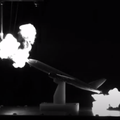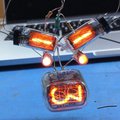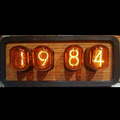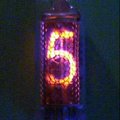-
Hack Chat Transcript, Part 2
10/28/2020 at 20:27 • 0 commentsRecycling - that would be very hard to do considering we produce very small quantity of tubes and sell them all over the world. We use just few grams of mercury per year - such a small quantity is enough for us.
![]() There are similar issues with LEDs and CFLs, IIRC. One uses mercury and the other arsenic. Forget which uses which.
There are similar issues with LEDs and CFLs, IIRC. One uses mercury and the other arsenic. Forget which uses which.![]() CFLs uses Hg as well
CFLs uses Hg as well![]() Nixie tubes are much nicer than CLFs :)
Nixie tubes are much nicer than CLFs :)![]() @Dalibor Farny what gas mixture/ratio do you use in your tubes?
@Dalibor Farny what gas mixture/ratio do you use in your tubes?![]() sorry if this was already answered , how does mercury increase the lifespan out of interest?
sorry if this was already answered , how does mercury increase the lifespan out of interest?![]() I'm not in to chemistry or physics so I don't know what it is about the toxic elements that make them so suitable for use in lighting devices.
I'm not in to chemistry or physics so I don't know what it is about the toxic elements that make them so suitable for use in lighting devices.![]() BTW - is there anyone who could point me to a lawyer or some organization that could confirm that we fall under that RoHS exemption? I tried several people/organizations, but no one was able to give me good answer..
BTW - is there anyone who could point me to a lawyer or some organization that could confirm that we fall under that RoHS exemption? I tried several people/organizations, but no one was able to give me good answer..![]() Interesting to hear people are still making and using Nixie tubes. I don't think I've seen a device that uses those types of tubes since I last saw them many years ago where they were used in a photocopier for the counter display.
Interesting to hear people are still making and using Nixie tubes. I don't think I've seen a device that uses those types of tubes since I last saw them many years ago where they were used in a photocopier for the counter display.![]() It is believed that the large and heavy molecule of mercury inhibits fast moving ions of neon, so their impact to the cathode doesnt cause a knock-off of the cathode metal so often as it would happen without mercury. From my observations, the Hg filled tube is much more stable also from the cathode poisoning point of view.. From what I tried without Hg, all the tests were pretty disappoiting
It is believed that the large and heavy molecule of mercury inhibits fast moving ions of neon, so their impact to the cathode doesnt cause a knock-off of the cathode metal so often as it would happen without mercury. From my observations, the Hg filled tube is much more stable also from the cathode poisoning point of view.. From what I tried without Hg, all the tests were pretty disappoiting![]() very interesting, thanks!
very interesting, thanks!![]() @Kevin yes, we need to create our own market because nixie tubes doesnt have any advantages over modern lighting sources.. They are just beautiful and alien, so we make beautiful and alien clocks out of them :-)
@Kevin yes, we need to create our own market because nixie tubes doesnt have any advantages over modern lighting sources.. They are just beautiful and alien, so we make beautiful and alien clocks out of them :-)![]() That's advantage enough for me!
That's advantage enough for me!![]() @curiousmarc fortunately this advantage keeps our little business alive :-)
@curiousmarc fortunately this advantage keeps our little business alive :-)![]() could you make a lighting matrix using nixie technology? i'm not sure if that's been done before or not
could you make a lighting matrix using nixie technology? i'm not sure if that's been done before or not![]() Can you claim that your tubes are just really badly designed thermometers? (assuming that thermometers are still allowed to use mercury)
Can you claim that your tubes are just really badly designed thermometers? (assuming that thermometers are still allowed to use mercury)![]() What, like an LED matrix panel, just with cathodes for dots?
What, like an LED matrix panel, just with cathodes for dots?![]() I believe a matrix displays were made with neon..
I believe a matrix displays were made with neon..![]() oh cool
oh cool![]() Nixie-ASCII art?
Nixie-ASCII art?![]() Seven segment Nixies? Would be kind of like a Numitron, no?
Seven segment Nixies? Would be kind of like a Numitron, no?![]() @Andy Pugh RoHS is about the actual application - where customers use it, not about for what it is designed.. So if they are used in clocks, we need to match the rules.. :-)
@Andy Pugh RoHS is about the actual application - where customers use it, not about for what it is designed.. So if they are used in clocks, we need to match the rules.. :-)![]() Numitron is another example of alien technology.. Nowadays all displays look the same, but look at 60s - nixies, edge-lit, numitrons etc..
Numitron is another example of alien technology.. Nowadays all displays look the same, but look at 60s - nixies, edge-lit, numitrons etc..![]() @Dalibor Farny hey Dalibor, can you tell us a bit about how you bootstrapped the business- investors/business loans etc to cover your research phase? Seems the small nixie market might scare off conventional angel investors
@Dalibor Farny hey Dalibor, can you tell us a bit about how you bootstrapped the business- investors/business loans etc to cover your research phase? Seems the small nixie market might scare off conventional angel investors![]() Just like the 6-wheel formula 1 decased ago..
Just like the 6-wheel formula 1 decased ago..![]() *decades
*decades![]() i've got an electroluminescent display matrix that i need to get working
i've got an electroluminescent display matrix that i need to get working![]() @Dalibor Farny what penning mixture your R|Z568M have? I read 99% Neon and 1% argon, but unsure if that's actually used in nixies. Also have you tried to play with different mixtures to change the glow colour?
@Dalibor Farny what penning mixture your R|Z568M have? I read 99% Neon and 1% argon, but unsure if that's actually used in nixies. Also have you tried to play with different mixtures to change the glow colour? -
Hack Chat Transcript, Part 1
10/28/2020 at 20:27 • 0 commentsOK folks, let's get going. I'm Dan and I'll be the mod today for Dalibor Farny, who we're very glad to welcome to the chat.
Hi Dalibor, thanks for joining us today. Can you start us off with a little about your background and how you got started in Nixies?
![]() Hi everyone, I am really pleased you took your time to come here to have a chat today..
Hi everyone, I am really pleased you took your time to come here to have a chat today..![]() My name is Dalibor Farny, I live in Czech Republic (a small country next to Germany :-) )..
My name is Dalibor Farny, I live in Czech Republic (a small country next to Germany :-) )..![]() wow! That's a long ways away from where I live.
wow! That's a long ways away from where I live.![]() Before starting with nixie tubes in 2011, I was mostly in software - programming web apps, but I was also running my own projects as a business. It was a bit too stereotypic..
Before starting with nixie tubes in 2011, I was mostly in software - programming web apps, but I was also running my own projects as a business. It was a bit too stereotypic..![]() Q:
Q: You talked about the new spectroscope so that you can analyze the anode poisoning. Do you have a hint, what you will look for?
Or is there a way to use different gas'es so there is a different color glowing on the cathode?
imo: If anybode could pull that off, its you. Best wishes from Berlin, Germany
![]() And when I found nixie tubes.. I fell in love..
And when I found nixie tubes.. I fell in love..![]() Hello @Dalibor Farny
Hello @Dalibor Farny![]() Thank you for taking the time to hackChat with us!
Thank you for taking the time to hackChat with us!![]() @j the cathode poisoning - I now have alsmost all parts I need, now looking for a scroll pump.. As for the gases - it is possible, but from what I tried with argon, the lifespan is very short.. In couple of days the tube is heavily sputtered.
@j the cathode poisoning - I now have alsmost all parts I need, now looking for a scroll pump.. As for the gases - it is possible, but from what I tried with argon, the lifespan is very short.. In couple of days the tube is heavily sputtered.![]() Do you use a Penning mixture?
Do you use a Penning mixture?![]() Also, I cant use mercury to limit the sputtering of the metal - the mercury haze is more visible than the dim argon glow :-) So it looks like all the tube glows..
Also, I cant use mercury to limit the sputtering of the metal - the mercury haze is more visible than the dim argon glow :-) So it looks like all the tube glows..![]() yes, Penning mixture
yes, Penning mixture![]() Thanks! Is that a standard ratio?
Thanks! Is that a standard ratio?![]() q
q![]() I want to save this chat.
I want to save this chat.![]() @Nathan Diniz - No worries, I post a transcript right after the chat
@Nathan Diniz - No worries, I post a transcript right after the chat![]() Q - which alloy are you using for the filaments - if that's what they're called in a nixi?
Q - which alloy are you using for the filaments - if that's what they're called in a nixi?![]() cool
cool![]() another possibility is to use a helium - lightweight molecule that might not cause such erosion of the metal cathodes..
another possibility is to use a helium - lightweight molecule that might not cause such erosion of the metal cathodes..![]() Hi Dalibor - nick from the UK & Dubai here (and mod of neonixie-l) - Just love you clock - has pride of place in our house...
Hi Dalibor - nick from the UK & Dubai here (and mod of neonixie-l) - Just love you clock - has pride of place in our house...![]() @nick Hi Nick, nice to meet you here :-)
@nick Hi Nick, nice to meet you here :-)![]() @Lightning Phil we use 304 stainless steel that is commonly available and very good in terms of lifespan.. I heard that other manufacturers used Ni or NiFe cathodes as well as SS
@Lightning Phil we use 304 stainless steel that is commonly available and very good in terms of lifespan.. I heard that other manufacturers used Ni or NiFe cathodes as well as SS![]() Q - what is the lifespan using Helium?
Q - what is the lifespan using Helium?![]() @Clive I havent tried - the problem with argon is that we need to go to 5 times higher current to get the glow cover whole digit.. This makes the evaporation of the metal really fast..
@Clive I havent tried - the problem with argon is that we need to go to 5 times higher current to get the glow cover whole digit.. This makes the evaporation of the metal really fast..![]() @Dalibor Farny Q: From your testing, can you recommend a period of time where each element in a Nixie tube should be activated, and for what duration, to prevent poisoning? Is every 24 hours for a few seconds adequate, in the case of an always-on clock? (Which I know is not a great practice - better to have it motion sensing or only on when someone is around.)
@Dalibor Farny Q: From your testing, can you recommend a period of time where each element in a Nixie tube should be activated, and for what duration, to prevent poisoning? Is every 24 hours for a few seconds adequate, in the case of an always-on clock? (Which I know is not a great practice - better to have it motion sensing or only on when someone is around.)![]() Have you experimented with epoxy seals for the sockets? I know epoxy tends to degas a lot but do you think it would be possible?
Have you experimented with epoxy seals for the sockets? I know epoxy tends to degas a lot but do you think it would be possible?![]() @Andy Geppert I have a brief info here, I am working on more detailed one: https://docs.daliborfarny.com/documentation/cathode-poisoning-prevention-routine/
@Andy Geppert I have a brief info here, I am working on more detailed one: https://docs.daliborfarny.com/documentation/cathode-poisoning-prevention-routine/![]() Thanks Dalibor. Experimented with various tungsten alloys - thoriated being quite good - for x-ray production. Still spluttered. Wondering if the coatings used to low emission temp of cathodes would assist in spluttering reduction - they can be quite inert.
Thanks Dalibor. Experimented with various tungsten alloys - thoriated being quite good - for x-ray production. Still spluttered. Wondering if the coatings used to low emission temp of cathodes would assist in spluttering reduction - they can be quite inert.![]() generally, it is about the ratio between on/off time.
generally, it is about the ratio between on/off time.![]() @Lightning Phil as far as I know, coating was never used for nixie tube cathodes - it would simply wear out over time. Well made tube will last decades (using standard materials) - I believe this is enough..
@Lightning Phil as far as I know, coating was never used for nixie tube cathodes - it would simply wear out over time. Well made tube will last decades (using standard materials) - I believe this is enough..![]() Most of my efforts are now in getting leak rate lower and making sure we don't bring in contamination..
Most of my efforts are now in getting leak rate lower and making sure we don't bring in contamination..![]() Thanks :) Not having 100 kV should help too
Thanks :) Not having 100 kV should help too![]() Q - What is the recommended on/off ratio?
Q - What is the recommended on/off ratio?![]() Good news is that we havent had a leaky tube in last 4000 manufactured tubes - I mean reported leak by customer, we rejected couple of leakers before shipping
Good news is that we havent had a leaky tube in last 4000 manufactured tubes - I mean reported leak by customer, we rejected couple of leakers before shipping![]() Wow, that's a good streak
Wow, that's a good streak![]() @Clive I recommend to go through the link, the ratio is described here: https://docs.daliborfarny.com/documentation/cathode-poisoning-prevention-routine/
@Clive I recommend to go through the link, the ratio is described here: https://docs.daliborfarny.com/documentation/cathode-poisoning-prevention-routine/![]() @Lightning Phil long ago I worked on cathodes for ion rockets for about a year. They used porous tungsten electrodes with a consumable work function lowering material inside
@Lightning Phil long ago I worked on cathodes for ion rockets for about a year. They used porous tungsten electrodes with a consumable work function lowering material inside![]() @Lightning Phil I am sure some tubes will develop a leak over time, but it wont get as high as our first batches years ago ..
@Lightning Phil I am sure some tubes will develop a leak over time, but it wont get as high as our first batches years ago ..![]() @Dalibor Farny Great web link to avoid poisoning, thank you for sharing that.
@Dalibor Farny Great web link to avoid poisoning, thank you for sharing that.![]() Q: If you'd put a single Tube on a pendulum and use the fast switching time of a nixie-tube you could flash the numbers in space and build a swinging clock with it (You asked on twitter in a while, what you should do with only one nTube). I tried to build one. the numbers 0-10 show up nicely next to each other. the POV effeckt will not show effect, but one gets it. should i post a pic here ?
Q: If you'd put a single Tube on a pendulum and use the fast switching time of a nixie-tube you could flash the numbers in space and build a swinging clock with it (You asked on twitter in a while, what you should do with only one nTube). I tried to build one. the numbers 0-10 show up nicely next to each other. the POV effeckt will not show effect, but one gets it. should i post a pic here ?![]() @Phil G Tungsten would be best for the cathodes, but it is very difficult to form into shapes - not possible to etch etc..
@Phil G Tungsten would be best for the cathodes, but it is very difficult to form into shapes - not possible to etch etc..![]() yes, its not easy to work with.
yes, its not easy to work with.![]() Well 4000 successes is still great. Yesterday I retuned my 3rd duff Kodak 3D printer. That's 3 out of 3 failed.
Well 4000 successes is still great. Yesterday I retuned my 3rd duff Kodak 3D printer. That's 3 out of 3 failed.![]() What metal do you use for cathodes now? Inconel, perhaps?
What metal do you use for cathodes now? Inconel, perhaps?![]() @Dan Maloney 304 stainless steel
@Dan Maloney 304 stainless steel![]()
![]() Cool, TIL
Cool, TIL![]() @Dalibor Farny Have you experimented with epoxy seals for the sockets? I know epoxy tends to degas a lot but do you think it would be possible?
@Dalibor Farny Have you experimented with epoxy seals for the sockets? I know epoxy tends to degas a lot but do you think it would be possible?![]() @Lightning Phil I wonder how these companies handle the warranty - must be crazy
@Lightning Phil I wonder how these companies handle the warranty - must be crazy![]() I'm trying to remember the name of the company that did it. They were in kentucky, and they owned the "tungsten hollow cathode" market. TWTs, klystrons, etc.
I'm trying to remember the name of the company that did it. They were in kentucky, and they owned the "tungsten hollow cathode" market. TWTs, klystrons, etc.![]() @Phil G - ion rockets sound fun.
@Phil G - ion rockets sound fun.![]() Think Kodak is too massive to sink.
Think Kodak is too massive to sink.![]() Do you have to use a special glass to CTE-match the 304 stainless?
Do you have to use a special glass to CTE-match the 304 stainless?![]() @Lightning Phil it should have been. it was wasn't. that's a story for beers
@Lightning Phil it should have been. it was wasn't. that's a story for beers![]() @opeRaptor epoxy is good only for vacuum chambers etc.. not for tubes, it would outgas overtime. It also cant survive 120C+ temperature
@opeRaptor epoxy is good only for vacuum chambers etc.. not for tubes, it would outgas overtime. It also cant survive 120C+ temperature![]() @Phil G good plan
@Phil G good plan![]() Yes have some old HeNe laser tubes where the lenses are epoxied on. No good!
Yes have some old HeNe laser tubes where the lenses are epoxied on. No good!![]() @W5VO we spotweld the 304 cathodes to tungsten that matches the COE of the glass
@W5VO we spotweld the 304 cathodes to tungsten that matches the COE of the glass![]() @Dalibor Farny what is the ratio of leaky tube you have found at QC? and is there a specific cause that's recurrent?
@Dalibor Farny what is the ratio of leaky tube you have found at QC? and is there a specific cause that's recurrent?![]() Thank you @Dalibor Farny
Thank you @Dalibor Farny![]() @Lightning Phil Google "barium dispenser cathode," to learn about that class of cathode...
@Lightning Phil Google "barium dispenser cathode," to learn about that class of cathode...![]() @opeRaptor Torr Seal is pretty good but pricy. True it's good for pumped systems but not too shabby regarding outgassing and temperature
@opeRaptor Torr Seal is pretty good but pricy. True it's good for pumped systems but not too shabby regarding outgassing and temperature![]() @Guru-san not many, I think there is a box of 5-7 leaky tubes that were accumulated over 2-3 months. I will open them eventually to see what was wrong with them.
@Guru-san not many, I think there is a box of 5-7 leaky tubes that were accumulated over 2-3 months. I will open them eventually to see what was wrong with them.![]() @Lightning Phil yes, torr seal is perfect, I will use it for the gas analyzer - we will connect a glass pipe to the nixie tube using torr seal
@Lightning Phil yes, torr seal is perfect, I will use it for the gas analyzer - we will connect a glass pipe to the nixie tube using torr seal![]() Thanks @Dalibor Farny, that's some rigorous craftsmanship!
Thanks @Dalibor Farny, that's some rigorous craftsmanship!![]() If you are interested in anything from the "behind the scenes", feel free to ask. But we can continue with technical stuff, I could talk about it all day long :-)
If you are interested in anything from the "behind the scenes", feel free to ask. But we can continue with technical stuff, I could talk about it all day long :-)![]() @nick nice photo, I see there is a place for the colon tubes :-)
@nick nice photo, I see there is a place for the colon tubes :-)![]() Can you speak more about the manufacturing process?
Can you speak more about the manufacturing process?![]() I'm interested in how you got on to speed on the whole process. Running that lathe alone must have been a huge learning curve.
I'm interested in how you got on to speed on the whole process. Running that lathe alone must have been a huge learning curve.![]() @Dalibor Farny I notice that you keep a public sales and cash on hand record, have you always done that?
@Dalibor Farny I notice that you keep a public sales and cash on hand record, have you always done that?![]() and what products pay the bills?
and what products pay the bills?![]() also, what did you do before Nixies?
also, what did you do before Nixies?![]() @Dan Maloney the learning is the most time consuming process - the general issue of the nixie tube resurrection attempt is that we need to do so many different trades at the same time to be able to make the tubes well
@Dan Maloney the learning is the most time consuming process - the general issue of the nixie tube resurrection attempt is that we need to do so many different trades at the same time to be able to make the tubes well![]() Do you see the process being automated further in any way which might create opportunities to build smaller tube sizes or is there a point below which it will never be commercially viable?
Do you see the process being automated further in any way which might create opportunities to build smaller tube sizes or is there a point below which it will never be commercially viable?![]() To add to the barrage of questions - why vacuum level do you use in the tubes you ship?
To add to the barrage of questions - why vacuum level do you use in the tubes you ship?![]() @Phil G it wasnt always live, but from the beginning I published the financial statistics. I am planning a video on a cost structure - how much we pay for rent/material/wages etc..
@Phil G it wasnt always live, but from the beginning I published the financial statistics. I am planning a video on a cost structure - how much we pay for rent/material/wages etc..![]() has COVID been good for business, or bad?
has COVID been good for business, or bad?![]() @Phil G - googled "barium dispenser cathode" - looks healthier than some Cadmium based ones I've seen (and avoided)
@Phil G - googled "barium dispenser cathode" - looks healthier than some Cadmium based ones I've seen (and avoided)![]() @Richard Scales I want to build machines that will allow us to do things more productively - machine by machine.. I don't think anyone will ever be able to invest into automated nixie tube production - the market is very small and this is what I like on it :-)
@Richard Scales I want to build machines that will allow us to do things more productively - machine by machine.. I don't think anyone will ever be able to invest into automated nixie tube production - the market is very small and this is what I like on it :-)![]() Would it be possible to run a nixie with nitrogen or even low pressure air? The colours produced by N2 are incredibly beautiful, not just in air but also when a vacuum tube develops a leak, it's a stunning purple hue.
Would it be possible to run a nixie with nitrogen or even low pressure air? The colours produced by N2 are incredibly beautiful, not just in air but also when a vacuum tube develops a leak, it's a stunning purple hue.![]() BTW, I've long wanted to build a tube amp with MCU controls, and the values of the controls show on Nixie
BTW, I've long wanted to build a tube amp with MCU controls, and the values of the controls show on Nixie![]() Covid - so far so good, we werent affected, but I am afraid that in long term (1 year), there will be an impact
Covid - so far so good, we werent affected, but I am afraid that in long term (1 year), there will be an impact![]() @Dalibor Farny I have been told the glass from "back in the days" was different, somewhat easier to work with, can you comment on that?
@Dalibor Farny I have been told the glass from "back in the days" was different, somewhat easier to work with, can you comment on that?![]() @Dalibor Farny The clock is beautiful and much admired - it is with an original Jeff Thomas NixiSat (which I had to rebuild a few years ago...)
@Dalibor Farny The clock is beautiful and much admired - it is with an original Jeff Thomas NixiSat (which I had to rebuild a few years ago...)You are correct in that you seem to have sorted the in-gassing with the the later tubes.
![]() back in the days they had plenty of different materials, including better glasses for manufacture of the tubes (different compositions). Nowadays it is very difficult to obtain these glasses, especially in small quantity
back in the days they had plenty of different materials, including better glasses for manufacture of the tubes (different compositions). Nowadays it is very difficult to obtain these glasses, especially in small quantity![]() @Dalibor Farny what would be the optimal glass composition for nixie tubes?
@Dalibor Farny what would be the optimal glass composition for nixie tubes?![]() glass composition is dependent on the metal that you use for the wires that goes through the glass - you need to match the thermal expansion. If I could choose one it would be kovar metal and Schott 8250 kovar sealing glass. These two materials make perfect match - the kovar follows the non-linear thermal expansion of the glass, which makes it very good matched seal..
glass composition is dependent on the metal that you use for the wires that goes through the glass - you need to match the thermal expansion. If I could choose one it would be kovar metal and Schott 8250 kovar sealing glass. These two materials make perfect match - the kovar follows the non-linear thermal expansion of the glass, which makes it very good matched seal..![]()
![]() but for hand-forming of the stems (glass to metal seals) we can only use tungsten as it has high melting temperature..
but for hand-forming of the stems (glass to metal seals) we can only use tungsten as it has high melting temperature..![]() all the other metals would be burned off
all the other metals would be burned off![]() @nick amazing - can you see any cathode poisoning on the original 568m tubes? One of our customers tried them in our electronics and they developed poisoning quite fast..
@nick amazing - can you see any cathode poisoning on the original 568m tubes? One of our customers tried them in our electronics and they developed poisoning quite fast..![]() Have you had any problems with tungsten wire having longitudinal cracks?
Have you had any problems with tungsten wire having longitudinal cracks?![]() Joined late, but a long time ago the tool of my trade was an ion mill. The parts of that that were required to be very resistant to sputtering were Tantalum. That might be the perfect material for the numerals. But probably not the cheapest.
Joined late, but a long time ago the tool of my trade was an ion mill. The parts of that that were required to be very resistant to sputtering were Tantalum. That might be the perfect material for the numerals. But probably not the cheapest.![]() Jeff Thomas NixiSat from 20 years ago (Z5680M tubes) and a Dalibor Farny Zen clock (R|Z568M hand-crafted tubes)
Jeff Thomas NixiSat from 20 years ago (Z5680M tubes) and a Dalibor Farny Zen clock (R|Z568M hand-crafted tubes)![]() @Lightning Phil not actually, I spent quite lot of time sorting out the suppliers, now we get it from USA - very good and very expensive wire. Before we had problems with slightly contaminated surface of the wire (cleaning on manufacturers side) - this cause us lot of leakers over time :-(
@Lightning Phil not actually, I spent quite lot of time sorting out the suppliers, now we get it from USA - very good and very expensive wire. Before we had problems with slightly contaminated surface of the wire (cleaning on manufacturers side) - this cause us lot of leakers over time :-(![]() eBay tungsten wire is hit and miss... Old stock better than new far East
eBay tungsten wire is hit and miss... Old stock better than new far East![]() @Andy Pugh interesting, how it compared to stainless steel and tungsten?
@Andy Pugh interesting, how it compared to stainless steel and tungsten?![]() Interesting thanks @Dalibor Farny , Would a "circular stem" (for lack of the appropriate term) need different composition/tooling?
Interesting thanks @Dalibor Farny , Would a "circular stem" (for lack of the appropriate term) need different composition/tooling?![]()
![]() @Dalibor Farny Is there a way to control the thermal expansion of the glass to mach the tungsten?
@Dalibor Farny Is there a way to control the thermal expansion of the glass to mach the tungsten?![]() @Dalibor Farny do you bake out your SS wire?
@Dalibor Farny do you bake out your SS wire?![]() I didn't do any comparisons. We just bought new holders from the manufacturer when they eventually wore out, but that took a long, long time. I just assumed that the manufacturer was using tantalum for a reason.
I didn't do any comparisons. We just bought new holders from the manufacturer when they eventually wore out, but that took a long, long time. I just assumed that the manufacturer was using tantalum for a reason.![]() @Guru-san this is higher level - I am working on it. We have a supplier for the flat stems already and also an old semi automatic sealing machine for envelope-stem seal. I hope to make it all working, if it works out well, we will be able to manufacture a nixie tube with better productivity and lower cost
@Guru-san this is higher level - I am working on it. We have a supplier for the flat stems already and also an old semi automatic sealing machine for envelope-stem seal. I hope to make it all working, if it works out well, we will be able to manufacture a nixie tube with better productivity and lower cost![]() @Dalibor Farny the NixiSat has no cathode poisoning protection, so if you forget to rotate the tubes the unused digits do get poisoned - thanks for reminding me!! I need to work on those tubes... So many clocks, so little time...
@Dalibor Farny the NixiSat has no cathode poisoning protection, so if you forget to rotate the tubes the unused digits do get poisoned - thanks for reminding me!! I need to work on those tubes... So many clocks, so little time...![]() @Phil G we bake out whole nixie tube at the pumping system, we don't bake out individual parst
@Phil G we bake out whole nixie tube at the pumping system, we don't bake out individual parst![]() @Dalibor Farny Do you design the tubes to work with existing tube sockets or do you need to make your own sockes?
@Dalibor Farny Do you design the tubes to work with existing tube sockets or do you need to make your own sockes?![]() What vacuum level to you pull on the pumping system?
What vacuum level to you pull on the pumping system?![]() @Andy Pugh it is great experience from the real world - I will try to find a piece of tantalum and do some comparison. In case we need to abandon mercury one day..
@Andy Pugh it is great experience from the real world - I will try to find a piece of tantalum and do some comparison. In case we need to abandon mercury one day..![]() @Kevin our current RZ568M tube is compatible with the old socket for Z568M tube. But the new tube will be completely new pin layout as we use soft glass (very tricky and prone to cracks) and I wanted the best possible layout in order to relief stress in the glass
@Kevin our current RZ568M tube is compatible with the old socket for Z568M tube. But the new tube will be completely new pin layout as we use soft glass (very tricky and prone to cracks) and I wanted the best possible layout in order to relief stress in the glass![]() @Dalibor Farny got it. what's the getter in the tube at baking?
@Dalibor Farny got it. what's the getter in the tube at baking?![]() @Lightning Phil we pump to 10E-6 torr before filling the tubes, I though that it is overkill as the 60s carousels barely got to 10E-4 (mercury diff pumps), but it is not overkill - when you get to -6, you know the tube is clean..
@Lightning Phil we pump to 10E-6 torr before filling the tubes, I though that it is overkill as the 60s carousels barely got to 10E-4 (mercury diff pumps), but it is not overkill - when you get to -6, you know the tube is clean..![]() @Phil G we use ZrAl non-evaporable getters from SAES, the traditional flash getters (that mirror on the glass) cant be used as they would amalgamate with mercury over time..
@Phil G we use ZrAl non-evaporable getters from SAES, the traditional flash getters (that mirror on the glass) cant be used as they would amalgamate with mercury over time..![]() @opeRaptor the COE is determined by composition of the glass, we now use glass that match the COE of tungsten
@opeRaptor the COE is determined by composition of the glass, we now use glass that match the COE of tungsten![]() Sounds good. Brimar (https://brimaruk.com/) has inherited a lot of mercury diff pumps. Trying to encourage a move towards a turbo.
Sounds good. Brimar (https://brimaruk.com/) has inherited a lot of mercury diff pumps. Trying to encourage a move towards a turbo.![]() @Dalibor Farny - it sounds like there are still suppliers for tube materials and parts. Is that so? If so, what markets are they serving? IOW, besides you, who is still making tubes?
@Dalibor Farny - it sounds like there are still suppliers for tube materials and parts. Is that so? If so, what markets are they serving? IOW, besides you, who is still making tubes?![]() @Dalibor Farny how seasonal is your business, do you have to build half the year for the end of year holiday season?
@Dalibor Farny how seasonal is your business, do you have to build half the year for the end of year holiday season?![]() @Lightning Phil I am watching Brimar guys - they got whole factory back to UK, it is crazy task to refurbish the machines.. I am curious whether they can pull it off - fingers crossed!
@Lightning Phil I am watching Brimar guys - they got whole factory back to UK, it is crazy task to refurbish the machines.. I am curious whether they can pull it off - fingers crossed!![]() I was helping with their vacuum stuff till COVID kicked in and spoilt the fun. Also I'm moving to Finland so had to step back a bit. Brimar seem to be doing a good job. Starting with the basics and working up.
I was helping with their vacuum stuff till COVID kicked in and spoilt the fun. Also I'm moving to Finland so had to step back a bit. Brimar seem to be doing a good job. Starting with the basics and working up.![]() @Dan Maloney it is actually very difficult - SAES does much more things than just getters (e.g. memory alloys), the tube market is very small. Most of the market is about small audio tubes - Shuguang is China is the biggest manufacturer I think, they supply also other factories with nickel alloys for cathode tubes in indirectly heated tubes..
@Dan Maloney it is actually very difficult - SAES does much more things than just getters (e.g. memory alloys), the tube market is very small. Most of the market is about small audio tubes - Shuguang is China is the biggest manufacturer I think, they supply also other factories with nickel alloys for cathode tubes in indirectly heated tubes..![]() The tube industry needs very specific materials and the size of the market (small) doesn't allow for a regular factory to operate - it always a factory that got the machines paid in 50s or people investing their savings and trying to find a business model for their productions (new Western Electric tubes, RCH tubes etc..)
The tube industry needs very specific materials and the size of the market (small) doesn't allow for a regular factory to operate - it always a factory that got the machines paid in 50s or people investing their savings and trying to find a business model for their productions (new Western Electric tubes, RCH tubes etc..)![]() I can see that. I mean, your lathe looks like it's straight out of the 50s itself. Pity there's not more demand for tubes -- such a fascinating technology.
I can see that. I mean, your lathe looks like it's straight out of the 50s itself. Pity there's not more demand for tubes -- such a fascinating technology.![]() @Lightning Phil very interesting, there are not many updates from Brimar online, great to hear they keep going!
@Lightning Phil very interesting, there are not many updates from Brimar online, great to hear they keep going!![]() @Dan Maloney 1968 :-) it is a beautiful machine.. It is fascinating technology and something where you can actually see the physics - the ICs and more modern stuff is too abstract for me :-)
@Dan Maloney 1968 :-) it is a beautiful machine.. It is fascinating technology and something where you can actually see the physics - the ICs and more modern stuff is too abstract for me :-)![]() @Dalibor Farny - I've been following a guy on YouTube called Usagi Electronics - he does logic circuits with vacuum tubes. Really interesting stuff. Might invite him on for a Hack Chat.
@Dalibor Farny - I've been following a guy on YouTube called Usagi Electronics - he does logic circuits with vacuum tubes. Really interesting stuff. Might invite him on for a Hack Chat.![]()
https://www.youtube.com/watch?v=UPD1_nIL87s
![]() @Dalibor Farny If you're interested in discussing differentially pumped temporary stem seals for degassing tubes I'm happy to do so off line. The but shell version is - to evacuate a vacuum tube with an attached capillary tube - use 2 seals, so the high vacuum seal is only holding high vacuum to low vacuum rather than atmosphere.
@Dalibor Farny If you're interested in discussing differentially pumped temporary stem seals for degassing tubes I'm happy to do so off line. The but shell version is - to evacuate a vacuum tube with an attached capillary tube - use 2 seals, so the high vacuum seal is only holding high vacuum to low vacuum rather than atmosphere.![]() @Dan Maloney look at Sam Zeloof - that guy makes his own integrated circuits, whole another level of DIY :-D
@Dan Maloney look at Sam Zeloof - that guy makes his own integrated circuits, whole another level of DIY :-D![]() nut not but
nut not but![]() Next year, once H-tube is developed and in production, I want to start on "F" tube - that lower cost tube with flat base. It will need a total reorganization on our side, but I hope we will be able to get our price lower. If we bacnrupt while trying the "F" model, I will continue alone and want to do crazy stuff like a clocks without ICs etc..
Next year, once H-tube is developed and in production, I want to start on "F" tube - that lower cost tube with flat base. It will need a total reorganization on our side, but I hope we will be able to get our price lower. If we bacnrupt while trying the "F" model, I will continue alone and want to do crazy stuff like a clocks without ICs etc..![]() just completely 60s technology, as authentic as possible.. Logical circuits with vacuum tubes sonds like something I could learn :-)
just completely 60s technology, as authentic as possible.. Logical circuits with vacuum tubes sonds like something I could learn :-)![]() Will follow that for sure!
Will follow that for sure!![]() Mechanically controlled Nixie tubes?
Mechanically controlled Nixie tubes?![]() So the Project H tube is going to be a product? I thought it was just a build for a special client.
So the Project H tube is going to be a product? I thought it was just a build for a special client.![]() That usagi electronics channel is amazing, I will go through the videos. Looking at how grey the guy became at his age, I expect the stuff he is doing is pretty challenging! :-)
That usagi electronics channel is amazing, I will go through the videos. Looking at how grey the guy became at his age, I expect the stuff he is doing is pretty challenging! :-)![]() I straight-up love his hairstyle!
I straight-up love his hairstyle!![]() @Dan Maloney yes, it must be a product - otherwise it would be a pure loss from the financial point of view. My goal is to get to $400 price for customer - so fingers crossed :-)
@Dan Maloney yes, it must be a product - otherwise it would be a pure loss from the financial point of view. My goal is to get to $400 price for customer - so fingers crossed :-)![]() Thanks for the link Dan, didn't know about him!
Thanks for the link Dan, didn't know about him!![]() Holy smokes, just looked at the clock and we've burned through our hour! That was really fast -- too fast, in fact. But, we have to let Dalibor get back to work if he has to. I just want to say a huge thanks to him for spending his time with us today, and to everyone for the great chat.
Holy smokes, just looked at the clock and we've burned through our hour! That was really fast -- too fast, in fact. But, we have to let Dalibor get back to work if he has to. I just want to say a huge thanks to him for spending his time with us today, and to everyone for the great chat.![]() Thanks Dalibor - very interesting chat.
Thanks Dalibor - very interesting chat.![]() All super interesting, thanks Dalibor, keep up the great work.
All super interesting, thanks Dalibor, keep up the great work.![]() it is 9 pm here already the work was already done today :-)
it is 9 pm here already the work was already done today :-)![]() thank you guys, it is very much motivating to see people interested in what I do. I would give million times without having the community and wonderful customers around. I was great evening (for me!).
thank you guys, it is very much motivating to see people interested in what I do. I would give million times without having the community and wonderful customers around. I was great evening (for me!).![]() OK, well the Hack Chat is always open, so keep the conversation going if you like! I'll wait a little bit to pull a transcript.
OK, well the Hack Chat is always open, so keep the conversation going if you like! I'll wait a little bit to pull a transcript.![]() Okay, no problem, any other questions you would like to ask guys?
Okay, no problem, any other questions you would like to ask guys?![]() @Dalibor, still holding on for that RB-7971 ;-)
@Dalibor, still holding on for that RB-7971 ;-)![]() But I will just mention: no Hack Chat next week. We're taking a break to get ready for Remoticon. Hope to "see" you all there!
But I will just mention: no Hack Chat next week. We're taking a break to get ready for Remoticon. Hope to "see" you all there!![]() Thank you so much for your time @Dalibor Farny, thanks for bringing nixie tubes making back to life :)
Thank you so much for your time @Dalibor Farny, thanks for bringing nixie tubes making back to life :)![]() @Dalibor Farny With environmental concerns resulting in creation/adoption of RoHS why are elements like mercury still being used? Do you have a recycling program for old tubes?
@Dalibor Farny With environmental concerns resulting in creation/adoption of RoHS why are elements like mercury still being used? Do you have a recycling program for old tubes?![]() @Richard Scales yes, 7971 tube is something that I would really like to get to..
@Richard Scales yes, 7971 tube is something that I would really like to get to..![]() Great news - put me down for a set.
Great news - put me down for a set.![]() @Kevin there is unfortunately no alternative for Hg. I believe we fall under one of the exemptions from RoHS, but this is expiring in June 2021 - I hope the lighting industry will push the renewal. Nixie tubes without mercury are practically useles
@Kevin there is unfortunately no alternative for Hg. I believe we fall under one of the exemptions from RoHS, but this is expiring in June 2021 - I hope the lighting industry will push the renewal. Nixie tubes without mercury are practically useles
 Lutetium
Lutetium





 What, like an LED matrix panel, just with cathodes for dots?
What, like an LED matrix panel, just with cathodes for dots?





